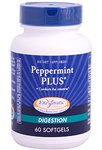| |
Peppermint |
|
|
Peppermint (Mentha piperita) is a sterile hybrid mint, a cross between watermint and spearmint, with a high menthol content. Peppermint is an aromatic perennial plant that grows to about two feet tall. Peppermint belongs to the Lamiaceae family and grows throughout North America, Asia, and Europe. Peppermint is also known as Mentha piperita, brandy mint, and lamb mint. Peppermint plants bloom from July through August, sprouting tiny purple flowers in whorls and terminal spikes. The stems of the plant grow to approximately 60 cm or higher and develop leaves that are up to 9 cm long and 3 cm wide with a serrated margin. The leaves are from 1 to 2 inches long, about half as wide, pointed, and with sharply toothed margins. |
| |
Active constituents of peppermint |
|
| The main ingrediets of peppermint are menthol, menthone, and menthyl acetate. Other components include terpenoids, flavenoids, polymerized polyphenols, carotenes, tocopherols, betaine, and choline. Menthyl acetate is responsible for peppermint's minty aroma and flavor. Menthol is classed as an antipruritic, which reduces itching. Menthol also has local anesthetic and counterirritant qualities. |
| |
Medicinal uses and health benefits of peppermint |
|
| Peppermint calms digestive spasms, relieves gas, boosts the flow of bile, fights bacteria, and acts as a decongestant. It acts as a
sedative on the stomach and strengthens the bowels. Peppermint is used to increase the flow of digestive juices and bile while relaxing the muscles of the digestive tract. The menthol in peppermint increases the beneficial flow of all digestive juices, including bile. Menthol also acts to stimulate the stomach lining. Its cooling properties soothe the stomach and ease stomach pain. Peppermint calms the muscles of the stomach and improves the flow of bile, which the body uses to digest fats. Peppermint is an expectorant and decongestant. Peppermint tea may offer some relief for mild asthma attacks, lessening bronchial constriction and making it easier to breathe. Peppermint's antispasmodic effect can provide significant relief for the abdominal pain, bloating, alternating periods of constipation and diarrhea, and general abdominal discomfort associated with this intestinal condition. Peppermint oil generates antispasmodic activity as well as provides relief for liver and gallbladder complaints, bloating, abdominal pain, and flatulence. Peppermint promotes sweating, which may help regulate body temperature when a fever. The distinctive aroma of Peppermint is believed to improve concentration, relieve headaches, and reduce mental fatigue. Topically, peppermint has been used for muscle and nerve pain and as an antiseptic. Peppermint is a cooling, relaxing herb that contains properties that help ease inflamed tissues, calm muscle spasms or cramps, and inhibit bacteria and microorganisms. Peppermint is an effective relaxant and can be helpful in treating nervous insomnia, stress, anxiety, and restlessness. |
| |
Dosage and administration of peppermint |
|
| Peppermint is available as tea, tinctures, capsules, creams, ointments, or essential oil. Enteric-coated capsules of peppermint oil are used to treat irritable bowel syndrome. A tincture can be prepared by adding 1 part peppermint oil to 9 parts pure grain alcohol. To prepare the tea, pour 8 ounces of boiling water over 1-2 teaspoons of dried peppermint leaves, cover and steep for 10 minutes, and then strain. For digestive disorders, drink one cup of tea with meals. For relief of migraine pressure, drink 1-2 cups of cool tea daily. For congestion, drink up to four cups of peppermint tea a day. For irritable bowel syndrome, take 1 to 2 coated capsules three times per day between meals. For itching and skin irritations, apply menthol in a cream or ointment form no more than three to four times per day. |
| |
Side effects, precautions, interactions |
|
Peppermint is generally a safe with proper use. However, peppermint oil should not be applied to the faces of infants or small children. Peppermint should not be used by those with gastoesophageal reflux disease. Menthol or peppermint oil applied to the skin can cause contact dermatitis or other type of rash. Peppermint oil can cause heartburn. Using enteric-coated capsules usually prevents this. |
|
|
|
|
 Peppermint Plus by Enzymatic Therapy soothes the intestine with antispasmodic effects. Enteric-coated softgels resist digestion in the stomach, and allow the formula to move to the intestines, where it's released for optimum benefit. Peppermint Plus includes oil extracts of peppermint, rosemary, and thyme. Peppermint soothes stomach discomforts by smoothing the intestinal muscle. Rosemary stimulates appetite and improves gastric tone, allowing food to be more easily digested. Thyme comforts the stomach and helps relieve gas. Click here for more information.
Peppermint Plus by Enzymatic Therapy soothes the intestine with antispasmodic effects. Enteric-coated softgels resist digestion in the stomach, and allow the formula to move to the intestines, where it's released for optimum benefit. Peppermint Plus includes oil extracts of peppermint, rosemary, and thyme. Peppermint soothes stomach discomforts by smoothing the intestinal muscle. Rosemary stimulates appetite and improves gastric tone, allowing food to be more easily digested. Thyme comforts the stomach and helps relieve gas. Click here for more information.